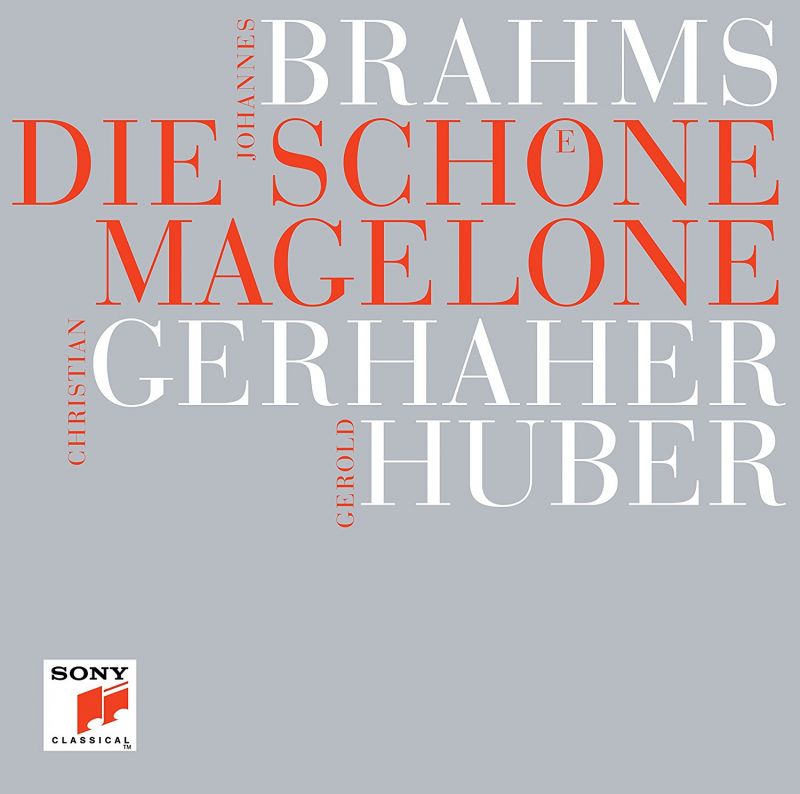BRAHMS Die schöne Magelone
View record and artist detailsRecord and Artist Details
Composer or Director: Johannes Brahms
Genre:
Vocal
Label: Sony Classical
Magazine Review Date: 03/2017
Media Format: CD or Download
Media Runtime: 54
Mastering:
DDD
Catalogue Number: 88985 413122

Tracks:
| Composition | Artist Credit |
|---|---|
| (15) Romanzen aus 'Die schöne Magelone' |
Johannes Brahms, Composer
Christian Gerhaher, Baritone Gerold Huber, Piano Johannes Brahms, Composer |
Author: David Patrick Stearns
What looks like a Lieder cycle is better compared to songs in Shakespeare plays. The Magelone texts in the 1797 Johann Ludwig Tieck novel function as poetic interludes, but even when set to substantial music by the young Brahms (finished in 1869), they still decorate the story rather than telling it. Still, the 15 songs in the collection need some sort of plot context, if only to tell which of the novel’s characters are singing and why. Narration is heard in the German release of this disc – in a tightened version by Martin Walser. But English-speaking listeners must rely on the booklet or on kellydeanhansen.com, which also gives structural analysis of the songs.
The piece requires more effort than usual, though this new Christian Gerhaher/Gerold Huber recording rewards such a listening commitment. They aren’t just in peak form but create a polar opposite experience to the piece’s 1971 reference recording by Dietrich Fischer-Dieskau and Sviatoslav Richter (now available on the EMI/Warner Icon Box devoted to Richter). Fischer-Dieskau and Richter project youthful brashness with explosive musical contrasts plus a swaggering portrayal of Peter (the knight who is central to the story and sings most of the songs). They also make you aware that this music is un-codified Brahms. Forms are fluid, with strophic songs suddenly morphing into something else. Musical ideas don’t follow each other as thoughtfully as in later Brahms.
In contrast, Huber looks for ways to make the music more integrated and coherent while also exploring the harmonic content, and he has a warmer recording acoustic than Richter. Fischer-Dieskau’s Peter is a confident conquerer, while Gerhaher’s is a lover, a complex neurotic one in a characterisation moulded from a keen look at what the poetry tells us. Peter’s ‘timid face’ in the fifth song seems to dictate a lot of the softer, more awed-sounding vocal colours that Gerhaher brings to some of the other songs. In fact, his colouring is more precise and apt than I’ve ever heard from him. And that’s saying a lot. However impressive and charismatic Fischer-Dieskau and Richter are (and Richter finds great meaning in the humblest transitional passage), Gerhaher and Huber make the piece something you can take to your heart.
Narration might make it even better. Two now-deleted Teldec Magelones show how well that can be done: the 1994 Brigitte Fassbaender recording (10/94) using the narration as breathing space between her stentorian vocal turns, and the 2000 Christoph Prégardien recording (12/00) having English narration by none other than Vanessa Redgrave. Alan Blyth found her to be ‘a shade affected’ but, with my new-found affection for Die schöne Magelone, I’d welcome it back.
Discover the world's largest classical music catalogue with Presto Music.

Gramophone Digital Club
- Digital Edition
- Digital Archive
- Reviews Database
- Full website access
From £8.75 / month
Subscribe
Gramophone Full Club
- Print Edition
- Digital Edition
- Digital Archive
- Reviews Database
- Full website access
From £11.00 / month
Subscribe
If you are a library, university or other organisation that would be interested in an institutional subscription to Gramophone please click here for further information.




